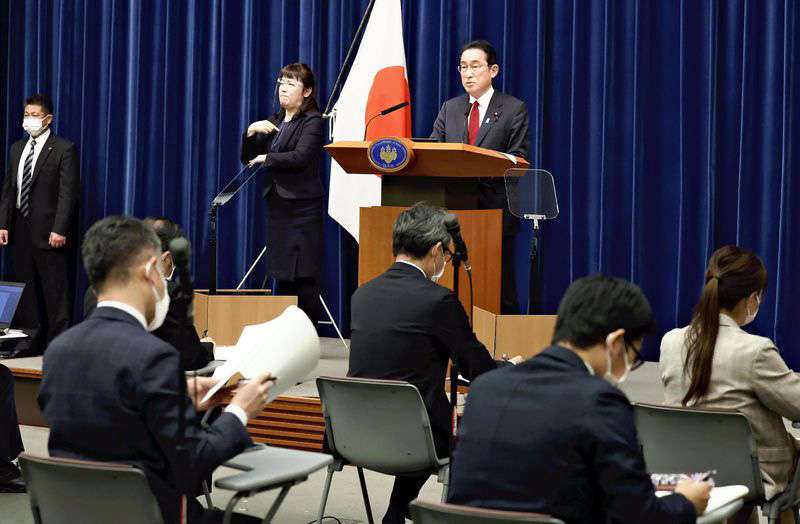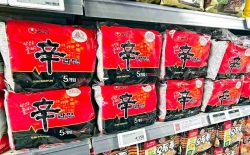
Prime Minister Fumio Kishida announces additional sanctions on Russia at a press conference at the Prime Minister’s Office on Friday.
14:19 JST, February 26, 2022
The possible impact on East Asia’s security environment stemming from Russia’s invasion of Ukraine is making the Japanese government increase its vigilance.
The government believes that failure on the part of the international community to hold Russia in check would send the wrong message to China, possibly prompting Beijing to attempt to unilaterally change the status quo in the region, especially regarding Taiwan.
“Japan must clearly show its position that we will never tolerate any attempt to change the status quo by force,” Prime Minister Fumio Kishida said Friday during a press conference after announcing additional sanctions on Russia. “By doing so, it will lead to keeping in check similar actions in regions including Asia.”
On his mind was China, which has been increasing pressure militarily in the East and South China Seas.
Chinese President Xi Jinping, steadfastly maintaining his objective to unify China and Taiwan, is continuing his country’s military threats in areas around Taiwan. The sailing by China Coast Guard vessels in waters surrounding the Senkaku Islands of Okinawa Prefecture has also become routine, with these vessels also repeatedly entering Japan’s territorial waters.
Beijing and Moscow have in common the attitude that they would not mind expanding their territory by force.
Comparing the Russia-Ukraine situation to the China-Taiwan issue, a senior Liberal Democratic Party official said, “Even if nothing happens right away between China and Taiwan, there is the possibility that the invasion of Ukraine by Russia might exert an impact on China-Taiwan five, maybe 10 years from now.”
Tokyo has grown especially sensitive to a closer ties between Beijing and Moscow. Russian President Vladimir Putin and Xi, during their summit early this month, agreed to boost trade relations between the two countries, a move seen as beefing up their cooperation in anticipation of the economic sanctions slapped on Russia for its invasion of Ukraine.
On Thursday, Chinese and Russian foreign ministers held conversations over the phone, with the Chinese side reportedly showing its understanding of Russia’s assertions.
Both countries have also been deepening their military ties by revving up joint activities in areas around Japan. In November, Chinese and Russian bombers jointly flew over the Sea of Japan, the East China Sea and the Pacific Ocean, entering Japan’s air defense identification zone (ADIZ).
Former Prime Minister Shinzo Abe, at a meeting of the ruling LDP on Friday, showed his alarm by saying, “Russia’s armed aggression is a serious event in the sense of predicting how China will handle Taiwan.”
According to Japan’s Foreign Ministry, multiple military aircraft from China entered Taiwan’s ADIZ on Thursday.
“This was a situation where they came, just as expected,” said Masahisa Sato, director of the Foreign Affairs Division of the LDP, at the Friday meeting, suggesting China’s provocation was timed with Russia’s invasion of Ukraine.
How the situation turns out in Ukraine might accelerate discussions on the national security strategy, the principles guiding Japan’s security policy, that the government plans to revise at the end of this year.
“As we are seeing Russia’s invasion with our own eyes,” said a former Cabinet minister, “it is only natural for discussions on enhancing defense capabilities to heat up in Japan.”
Top Articles in World
-

Israeli Ambassador to Japan Speaks about Japan’s Role in the Reconstruction of Gaza
-

Videos Plagiarized, Reposted with False Subtitles Claiming ‘Ryukyu Belongs to China’; Anti-China False Information Also Posted in Japan
-

North Korea Possibly Launches Ballistic Missile
-

Chinese Embassy in Japan Reiterates Call for Chinese People to Refrain from Traveling to Japan; Call Comes in Wake of ¥400 Mil. Robbery
-

Russia: Visa Required for Visiting Graves in Northern Territories, Lifting of Sanctions Also Necessary
JN ACCESS RANKING
-

Japan PM Takaichi’s Cabinet Resigns en Masse
-

Japan Institute to Use Domestic Commercial Optical Lattice Clock to Set Japan Standard Time
-

Israeli Ambassador to Japan Speaks about Japan’s Role in the Reconstruction of Gaza
-

Man Infected with Measles Reportedly Dined at Restaurant in Tokyo Station
-

Videos Plagiarized, Reposted with False Subtitles Claiming ‘Ryukyu Belongs to China’; Anti-China False Information Also Posted in Japan





















